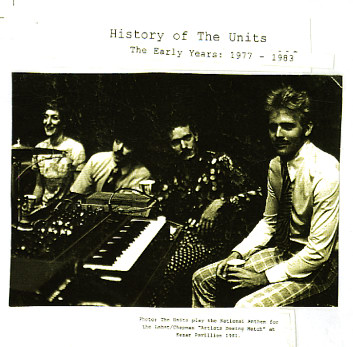Well, you don’t need a potted history of San Francisco synthpunk OGs The Units, when <a href="http://thequietus.com/articles/03318-the-units-high-pressure-days-in-san-francisco" target-"out">you can read the long and strong interview with the band’s founding father Scott Ryser, which The Quietus has just put up at the time of writing. (And don’t you dare say you don’t have time to read that; you do, it’s just that you divide up your leisure time poorly.) What you might need – NEED – is that extra push that makes you twig why this band, in the six-year window implied in this compilation’s title, made remarkable music without frontiers. It is in no way to denigrate Devo to say that if those grand old mongoloids can make mad bank off the endless thirst for reformations, then everyone who can afford their £30 tickets should be able to find a tenner or so spare to own this terrific anthology.
The Units were punks, of a sort, but not from the Sid Thunders tabloid-fodder mould. They did Art Things with bohemian pride, for example playing inside a SF department store in the daytime as part of a window display-cum-installation. The band were a fixture of Dirk Dirksen’s boundary-free punk bills at SF’s Mabuhay Gardens venue in the late 70s, when other likely locals included the Dead Kennedys, Negative Trend and The Zeros – Dirksen, who died in 2006, would be delighted that the opening track on History Of The Units is a recording of him, in his MC role, insulting the crowd before accidentally-on-purpose introducing The Units as The Zeros.
The idea behind the band name is referenced in the words of ‘Warm Moving Bodies’, a militaristically upbeat blowout that, musically, throws a metaphorical rope across the Midwest to NYC’s no wave clockpunchers Theoretical Girls, intones its chorus in a suspiciously similar fashion to ‘Warm Leatherette’, and lyrically dehumanises the individual, favouring cold biology over lionizing the miracle of conception: "Skyscraper cells, full of water / A portion of water, structure and substance / Scientifically different than the monkey."
If one was called on to zone in on one particular track to turn a curious genre dabbler into a paid-up Unit cheerleader, the answer has to be ‘High Pressure Days’, recently remixed by German postpunk electrodudes Headman. I really don’t think it would be too outlandish to cite this as a chain link in the evolution of in-your-face synthesized rock music. Clearly, The Units are always going to enjoy a cultist reputation and no more, bracketed with (contemporaries) The Screamers and Nervous Gender when Devo and Throbbing Gristle get listed in actual ‘history of rock’ type books, but they were part of a tangible reaction against REAL ROCK orthodoxy (which very much incorporated punk, no matter how shocking it might have been in 1977), the trickle-down theory of which has baptized great modern outfits like Jay Reatard, Adult. and Digital Leather. There are moments such as ‘I Night’ where you can trace lines back from the histrionics of Circle, Trans Am and the hiiiiiigh camp of 80s-era Judas Priest to The Units, too, even if it might be pushing it to try and claim a literal influence.
In hindsight, it’s possible to look at them as both ahead of, and very much of, their time: ‘Digital Stimulation’ ("He pulled out his digital calculator / And figured out a formula on how he could mate her") is a period piece roughly equivalent to writing a song about seducing someone by posting a video of yourself on YouTube. By 1983, they were palpably reacting to the synthpop carpetbombing from the UK’s Numanoid armies. ‘Contemporary Emotions’ is bleak, bunker-mentality stuff that runs parallel to the coldwave scene that was sprouting in Belgium and France at about the same time; it’s actually a cover, albeit one with a strange backstory. Written by Jimmy Berik, frontman of late-Sixties Californian thud-rockers Trakstod, it was never released or even recorded at the time, so The Units’ version is effectively from Scott’s memory of being blown away by their amp-heavy performances as a kid. ("The unique thing about Jimmy’s ‘Contemporary Emotions’ was that he played it on a lap steel guitar. I had never seen it done before or since. Up till then, I’d only seen country and western guys play steel guitar, but Jimmy played it through an Echoplex and a Marshall stack, like the way I play synthesizer – only ten times better.")
From their debut single, ‘Cowboy’ is another thing altogether, seemingly attempting to cover at least two of the bases of mid-Seventies Krautrock in four and a half minutes: Roedelian space ambience first up, then La Dusseldorf-suggestive Roman road rock. ‘Run’, which ridiculously has remained unreleased until now, is perhaps the most musically discordant and dense nugget here, keyboards swooping from speaker to speaker and what sounds like documentary samples doing nothing to quell the unease. ‘I-5’, again being unveiled for the first time, is an instrumental that is gonna crop up in more than a few Italo/space disco/etc mixes in the near future, or I’m a Dutchman.
Sometimes the embryonic nature of what The Units were doing shows itself in not wholly desirable ways – ‘East West 2’ is songless, circus-silly farting about and more than a little ‘keyboard demonstration’-y. Also, if you’re thinking that at this point in musical history, a bunch of first world dudes blankly pontificating about how ‘straight’ society is comprised of slavish ungulates tied to the grindstone is kind of a played out concept, then… I hear you. For all that, Ryser’s lyrics are a bit more creative with metaphor and simile than that might suggest; moreover, most of this CD was written at a time when a legitimate underground was being forged in the USA, and bands like The Units were staring down the barrel of a mainstream that wasn’t only grotesque, it was nearly impossible to retreat from. You don’t know how lucky you are.


